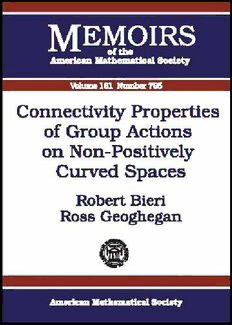Download Connectivity properties of group actions on non-positively curved spaces PDF Free - Full Version
Download Connectivity properties of group actions on non-positively curved spaces by Robert Bieri, Ross Geoghegan in PDF format completely FREE. No registration required, no payment needed. Get instant access to this valuable resource on PDFdrive.to!
About Connectivity properties of group actions on non-positively curved spaces
Generalizing the Bieri-Neumann-Strebel-Renz Invariants, this Memoir presents the foundations of a theory of (not necessarily discrete) actions $\rho$ of a (suitable) group $G$ by isometries on a proper CAT(0) space $M$. The passage from groups $G$ to group actions $\rho$ implies the introduction of 'Sigma invariants' $\Sigma^k(\rho)$ to replace the previous $\Sigma^k(G)$ introduced by those authors. Their theory is now seen as a special case of what is studied here so that readers seeking a detailed treatment of their theory will find it included here as a special case. We define and study 'controlled $k$-connectedness $(CC^k)$' of $\rho$, both over $M$ and over end points $e$ in the 'boundary at infinity' $\partial M$; $\Sigma^k(\rho)$ is by definition the set of all $e$ over which the action is $(k-1)$-connected. A central theorem, the Boundary Criterion, says that $\Sigma^k(\rho) = \partial M$ if and only if $\rho$ is $CC^{k-1}$ over $M$.An Openness Theorem says that $CC^k$ over $M$ is an open condition on the space of isometric actions $\rho$ of $G$ on $M$. Another Openness Theorem says that $\Sigma^k(\rho)$ is an open subset of $\partial M$ with respect to the Tits metric topology. When $\rho(G)$ is a discrete group of isometries the property $CC^{k-1}$ is equivalent to ker$(\rho)$ having the topological finiteness property type '$F_k$'. More generally, if the orbits of the action are discrete, $CC^{k-1}$ is equivalent to the point-stabilizers having type $F_k$. In particular, for $k=2$ we are characterizing finite presentability of kernels and stabilizers. Examples discussed include: locally rigid actions, translation actions on vector spaces (especially those by metabelian groups), actions on trees (including those of $S$-arithmetic groups on Bruhat-Tits trees), and $SL_2$ actions on the hyperbolic plane.
Detailed Information
| Author: | Robert Bieri, Ross Geoghegan |
|---|---|
| Publication Year: | 2003 |
| ISBN: | 9780821831847 |
| Pages: | 96 |
| Language: | English |
| File Size: | 1.001 |
| Format: | |
| Price: | FREE |
Safe & Secure Download - No registration required
Why Choose PDFdrive for Your Free Connectivity properties of group actions on non-positively curved spaces Download?
- 100% Free: No hidden fees or subscriptions required for one book every day.
- No Registration: Immediate access is available without creating accounts for one book every day.
- Safe and Secure: Clean downloads without malware or viruses
- Multiple Formats: PDF, MOBI, Mpub,... optimized for all devices
- Educational Resource: Supporting knowledge sharing and learning
Frequently Asked Questions
Is it really free to download Connectivity properties of group actions on non-positively curved spaces PDF?
Yes, on https://PDFdrive.to you can download Connectivity properties of group actions on non-positively curved spaces by Robert Bieri, Ross Geoghegan completely free. We don't require any payment, subscription, or registration to access this PDF file. For 3 books every day.
How can I read Connectivity properties of group actions on non-positively curved spaces on my mobile device?
After downloading Connectivity properties of group actions on non-positively curved spaces PDF, you can open it with any PDF reader app on your phone or tablet. We recommend using Adobe Acrobat Reader, Apple Books, or Google Play Books for the best reading experience.
Is this the full version of Connectivity properties of group actions on non-positively curved spaces?
Yes, this is the complete PDF version of Connectivity properties of group actions on non-positively curved spaces by Robert Bieri, Ross Geoghegan. You will be able to read the entire content as in the printed version without missing any pages.
Is it legal to download Connectivity properties of group actions on non-positively curved spaces PDF for free?
https://PDFdrive.to provides links to free educational resources available online. We do not store any files on our servers. Please be aware of copyright laws in your country before downloading.
The materials shared are intended for research, educational, and personal use in accordance with fair use principles.

